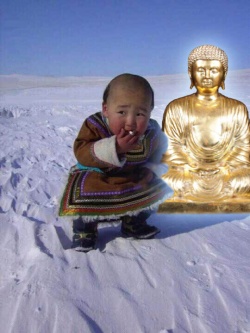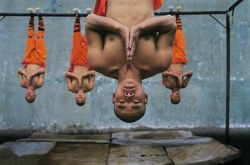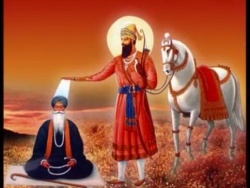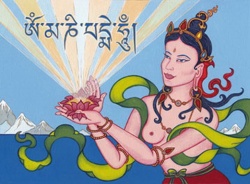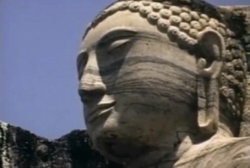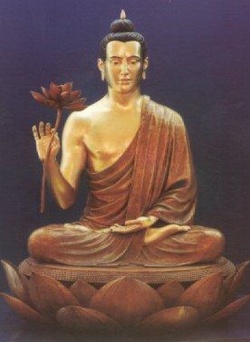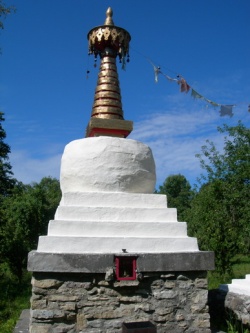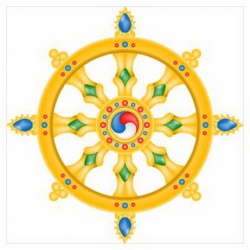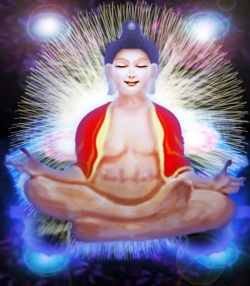Difference between revisions of "The Vinaya a few aspects"
(Created page with " All parties concerned accept that Sakyamuni Buddha, or Gautama Buddha, formulated a number of {{Wiki|rules}} for his monks, and that a fair number of {{Wiki|r...") |
|||
| Line 1: | Line 1: | ||
| − | + | <nomobile>{{DisplayImages|3731|1186|3822|1387|1883|158|3568|1675|3419|1526|3716|4119}}</nomobile> | |
| Line 10: | Line 10: | ||
The {{Wiki|rules}} on not damaging [[plants]] and not {{Wiki|killing}} of [[animals]] | The {{Wiki|rules}} on not damaging [[plants]] and not {{Wiki|killing}} of [[animals]] | ||
| − | The above mentioned Code, or [[Monastic Discipline]], contains a 'first category', {{Wiki|rule}} that forbids [[monks and nuns]] to damage [[plants]]. A participant contrasted this {{Wiki|rule}} with a 'third category' {{Wiki|rule}} on not {{Wiki|killing}} [[animals]]. Why should damaging [[plants]] be a more serious offence than the {{Wiki|killing}} of an [[animal]], he asked. | + | The above mentioned Code, or [[Monastic Discipline]], contains a 'first category', {{Wiki|rule}} that forbids [[monks and nuns]] to damage [[plants]]. |
| + | |||
| + | A participant contrasted this {{Wiki|rule}} with a 'third category' {{Wiki|rule}} on not {{Wiki|killing}} [[animals]]. | ||
| + | |||
| + | Why should damaging [[plants]] be a more serious offence than the {{Wiki|killing}} of an [[animal]], he asked. | ||
'First category' is a grave {{Wiki|rule}} or offence; 'third category' is less grave. | 'First category' is a grave {{Wiki|rule}} or offence; 'third category' is less grave. | ||
| − | Except for the three months [[rainy season]] the [[Buddha]] was continually on his way with a large following of [[monks]]. There must have been some roads in that part of [[India]] that he criss-crossed, but not too many; compare it large parts of Yorkshire and [[Scotland]]. | + | Except for the three months [[rainy season]] the [[Buddha]] was continually on his way with a large following of [[monks]]. |
| − | Now, in order to prevent the brotherhood trampling the freshly planted paddy and other crops, [[Buddha]] decided that during the three months of the [[rainy season]] one should not travel, and that during the rest of the time too the [[monks]] were not allowed to damage the crops — '[[plants]]' says the text. | + | |
| − | It would have been [[unthinkable]] that a group of [[monks]], just after sunrise, would stand outside the gate of this particular farm, [[alms bowl]] in hand, expecting the farmer's wife to ladle in some of those delicacies they destroyed just the day before. That is why not damaging [[plant life]] is a first [[degree]] offence. | + | There must have been some roads in that part of [[India]] that he criss-crossed, but not too many; compare it large parts of Yorkshire and [[Scotland]]. |
| − | Has it relevance for today's [[sangha]]? It depends on where this [[sangha]] [[lives]]. Generally we may say that the relevance is no longer there. | + | |
| + | |||
| + | Now, in order to prevent the brotherhood trampling the freshly planted paddy and other crops, | ||
| + | |||
| + | [[Buddha]] decided that during the three months of the [[rainy season]] one should not travel, and that during the rest of the time too the [[monks]] were not allowed to damage the crops — '[[plants]]' says the text. | ||
| + | |||
| + | It would have been [[unthinkable]] that a group of [[monks]], | ||
| + | |||
| + | just after sunrise, would stand outside the gate of this particular farm, [[alms bowl]] in hand, expecting the farmer's wife to ladle in some of those delicacies they destroyed just the day before. | ||
| + | |||
| + | That is why not damaging [[plant life]] is a first [[degree]] offence. | ||
| + | |||
| + | Has it relevance for today's [[sangha]]? It depends on where this [[sangha]] [[lives]]. | ||
| + | |||
| + | Generally we may say that the relevance is no longer there. | ||
Then why is it that {{Wiki|killing}} [[animals]] is a less grave offence than damaging crops? | Then why is it that {{Wiki|killing}} [[animals]] is a less grave offence than damaging crops? | ||
| − | [[Monks and nuns]] were not supposed to prepare their [[own]] [[food]]. Whatever they ate, and eat in the case of [[Theravāda]] [[monastics]], was [[food]] donated by the laity. They therefore had, and have, no worries about slaughtering a chicken or a pig. Therefore the {{Wiki|rule}} on not {{Wiki|killing}} [[animals]] was not laid down with [[respect]] to preparing [[food]], but with [[respect]] to defending oneself against the attacks of wild [[animals]]. One of the other {{Wiki|rules}} says that a [[monk]] was allowed to defend his [[life]] when under attack, unless he would be an [[arhat]], a [[fully enlightened being]] who in this [[life]] 'had done what had to be done'. | + | [[Monks and nuns]] were not supposed to prepare their [[own]] [[food]]. |
| + | |||
| + | Whatever they ate, and eat in the case of [[Theravāda]] [[monastics]], was [[food]] donated by the laity. | ||
| + | |||
| + | They therefore had, and have, no worries about slaughtering a chicken or a pig. | ||
| + | |||
| + | Therefore the {{Wiki|rule}} on not {{Wiki|killing}} [[animals]] was not laid down with [[respect]] to preparing [[food]], but with [[respect]] to defending oneself against the attacks of wild [[animals]]. | ||
| + | |||
| + | One of the other {{Wiki|rules}} says that a [[monk]] was allowed to defend his [[life]] when under attack, unless he would be an [[arhat]], a [[fully enlightened being]] who in this [[life]] 'had done what had to be done'. | ||
| + | |||
| + | {{Wiki|Killing}} an [[animal]] therefore was and is prohibited, but in case a [[monk]] had to kill this [[tiger]] in order to save his [[own]] {{Wiki|skin}} the penalty would not be so very heavy. | ||
| + | |||
| + | He had to confess, [[repent]], and in some cases he had to make it up by doing something exceptionally good for other, living, [[animals]]. | ||
| + | |||
| + | Although the practise on not preparing one's [[own]] [[food]] but going on [[almsround]] instead today only is upheld within the [[Theravāda tradition]], and not within the [[Mahāyana]], | ||
| + | |||
| + | the {{Wiki|rule}} on not {{Wiki|killing}} [[animals]] holds good, were it only because both the [[Theravāda]] and [[Mahayāna sūtric iterature]] is [[adamant]] on protecting all [[life]] as a means of obtaining [[enlightenment]] resp [[Buddhahood]]. | ||
| + | |||
| + | |||
| + | |||
| + | The [[Ovādapātimokkha]] | ||
| + | |||
| + | |||
| + | |||
| + | The [[vínaya]] ({{Wiki|emphasis}} on the first {{Wiki|syllable}}) is the Code of {{Wiki|Behaviour}} for [[Buddhist monks]] and [[nuns]]. | ||
| + | |||
| + | [[Sakyamuni Buddha's]] first five, then six [[disciples]] didn't need any code of conduct. | ||
| + | |||
| + | The first five were [[ascetics]] and sons of [[ascetics]] who knew 'how the hare runs', come to the correct {{Wiki|behaviour}} of an [[ascetic]]. | ||
| + | |||
| + | The sixth was a very refined merchant's son. | ||
| + | With the very rapid growth of the [[Buddhist Sangha]], it must have seemed useful to lay down a few {{Wiki|rules}}. | ||
| + | |||
| + | Some of the first several thousands of [[monks]] had been mendicant-ascetics belonging to a variety of [[belief]] systems, some came from high-cast background and were familiar with the {{Wiki|vedic}} and [[brahmanical]] [[rituals]], | ||
| + | |||
| + | but others had been {{Wiki|farmers}} and {{Wiki|merchants}} with no inside [[knowledge]] of any [[religious]] system at all. | ||
| − | {{Wiki| | + | The first set of {{Wiki|rules}} the [[Buddha]] gave his [[disciples]] provide a broad outline on how to approach the [[holy life]]. |
| − | + | This set of {{Wiki|rules}} is called the [[Ovādapātimokkha]] in the [[Pali language]]. | |
| + | This [[Ovādapātimokkha]] is the center of {{Wiki|ceremonial}} [[attention]] once a year when [[monks]] from the [[Theravāda-tradition]] assemble in commemoration of this one particular day when for the first time, spontaneously, without having been summoned, 1250 [[enlightened disciples]] assembled around [[Buddha]] to hear him give this [[Ovādapātimokkha]]. | ||
| − | The | + | The festivity is called [[Maha Bucha]] in [[Thai]], [[maha pūja]] in [[Pali]] and [[Sanskrit]], that is, the great [[festival of offering]]. |
| + | After the [[monks]] had left for their respective region of practising, [[teaching]] and preaching, from time to time [[word]] arrived that this or that [[monk]] had done this or that, | ||
| − | + | or said this or that, and [[people]] asked whether this was in accordance with [[Buddha's]] dispensation or not. | |
| − | |||
| − | + | As a result, as occasion arose, a rather elaborate set of {{Wiki|rules}} was laid down. | |
| − | + | These {{Wiki|rules}} are of no consequence to [[Buddhist]] lay followers; you don't wear [[robes]], therefore you don't need to {{Wiki|worry}} about wearing them in the proper way; | |
| − | |||
| + | you don't spend the night together with your brethren in one [[monastery]], therefore you don't need to {{Wiki|worry}} about that as well; you don't go on [[almsround]], therefore you don't need to {{Wiki|worry}} about walking and receiving the [[food]] in the proper way, etc. | ||
| − | + | But the [[Ovādapātimokkha]] could be taken at [[heart]] by both laity and [[monks and nuns]]. That is why the text is given below. It's a translation that the [[Thai Sangha]] published in the year 1969. | |
| − | These three verses, the [[Pātimokkha]] for Exhortation, were indeed spoken by the Lord, the One who | + | |
| + | Passages explaining the [[Ovādapātimokkha]] | ||
| + | |||
| + | |||
| + | These three verses, the [[Pātimokkha]] for Exhortation, were indeed spoken by the Lord, the [[One who Knows]], the One who Sees, the [[Arahant]], the [[Perfect Buddha]]: | ||
| Line 73: | Line 131: | ||
And how has [[moral conduct]] been rightly expounded by the Lord? The lower course of [[moral conduct]] has been rightly expounded by the Lord. Further, the higher course of [[moral conduct]] has been rightly expounded by the Lord. | And how has [[moral conduct]] been rightly expounded by the Lord? The lower course of [[moral conduct]] has been rightly expounded by the Lord. Further, the higher course of [[moral conduct]] has been rightly expounded by the Lord. | ||
| − | And how has the lower course of [[moral conduct]] been rightly expounded by the Lord? Here, a [[noble]] hearkener is restrained from destroying living creatures; is restrained from taking what is not given; is restrained from wrong conduct in {{Wiki|sexual}} relations; is restrained from [[false speech]]; is restrained from distilled and fermented [[intoxicants]] which are the occasion for [[carelessness]]. Thus it is that the lower course of [[moral conduct]] has been rightly expounded by the Lord. | + | And how has the lower course of [[moral conduct]] been rightly expounded by the Lord? |
| + | |||
| + | Here, a [[noble]] hearkener is restrained from destroying living creatures; is restrained from taking what is not given; is restrained from wrong conduct in {{Wiki|sexual}} relations; | ||
| + | |||
| + | is restrained from [[false speech]]; is restrained from distilled and fermented [[intoxicants]] which are the occasion for [[carelessness]]. Thus it is that the lower course of [[moral conduct]] has been rightly expounded by the Lord. | ||
And how has collectedness been rightly expounded by the Lord? The lower course of collectedness ([[samādhi]]) has been rightly expounded by the Lord. Further, the higher course of collectedness has been rightly expounded by the Lord. | And how has collectedness been rightly expounded by the Lord? The lower course of collectedness ([[samādhi]]) has been rightly expounded by the Lord. Further, the higher course of collectedness has been rightly expounded by the Lord. | ||
| − | And how has the lower course of collectedness been rightly expounded by the Lord? Here, a [[noble]] hearkener having made [[relinquishment]] his [[object]] gains collectedness, gains [[one-pointedness of mind]]. Thus it is that the lower course of collectedness has been rightly expounded by the Lord. | + | And how has the lower course of collectedness been rightly expounded by the Lord? |
| + | |||
| + | Here, a [[noble]] hearkener having made [[relinquishment]] his [[object]] gains collectedness, gains [[one-pointedness of mind]]. | ||
| + | |||
| + | Thus it is that the lower course of collectedness has been rightly expounded by the Lord. | ||
| + | |||
| + | And how has the higher course of collectedness been rightly expounded by the Lord? | ||
| + | |||
| + | Here, a [[bhikkhu]] ([[monk]]) aloof from sense-desires, aloof from [[unskillful]] [[thoughts]], attains and abides in he [[first concentration]] having application ([[vitakka]]) and sustenation ([[vicāra]])(of [[mind]]), | ||
| + | |||
| + | and being born of [[solitude]] ([[viveka]]), [[joy]] ([[pīti]]) and [[happiness]] ([[sukkha]]). | ||
| + | |||
| + | By the quietening of application and sustenation (of [[mind]]), the [[heart]] [[serene]] within and [[concentrated]] upon one point, without application and sustenation of [[mind]], | ||
| + | |||
| + | born of collectedness, [[joy]] and [[happiness]], he attains and abides in the second [[concentration]]. | ||
| + | |||
| + | By [[dispassion]] towards [[joy]] he dwells with [[equanimity]], [[mindful]], clearly comprehending and with the [[body]] [[experiences]] that [[happiness]] of which the [[ariyas]] say: | ||
| + | |||
| + | 'One with [[equanimity]] and [[mindfulness]] dwells happily,' and he attains and abides in the third [[concentration]]. | ||
| + | |||
| + | By giving up [[happiness]], by giving up [[dukkha]] ([[stress]]), by the [[disappearance]] of former joys and anguish, he attains and abides in the fourth [[concentration]], | ||
| + | |||
| + | with neither [[dukkha]] nor [[happiness]], completely [[pure]], with [[equanimity]] and [[mindfulness]]. | ||
| + | |||
| + | Thus it is that the higher course of collectedness has been rightly expounded by the Lord. | ||
| + | |||
| + | |||
| + | |||
| + | And how has [[wisdom]] been rightly expounded by the Lord? | ||
| + | |||
| + | |||
| + | |||
| + | The lower course of [[wisdom]] has been rightly expounded by the Lord. Further, the higher course of [[wisdom]] has been rightly expounded by the Lord. | ||
| + | |||
| + | And how has the higher course of [[wisdom]] been rightly expounded by the Lord? Here, a [[bhikkhu]] [[understands]] according to [[reality]], thus: | ||
| + | |||
| + | 'This is [[dukkha]]'; he [[understands]] according to [[reality]], thus: | ||
| + | |||
| + | 'This is the [[cause]] for the [[arising]] of [[dukkha]]'; he [[understands]] according to [[reality]], thus: | ||
| + | |||
| + | 'This is the [[cessation of dukkha]]'; he [[understands]] according to [[reality]], thus: | ||
| + | |||
| + | 'This is the practice-path leading to the [[cessation of dukkha]]'. Thus it is that the higher course of [[wisdom]] has been rightly expounded by the Lord. | ||
| + | |||
| + | When [[moral conduct]] is thoroughly developed, collectedness is of great fruit, of great advantage; when collectedness is thoroughly developed, | ||
| + | |||
| + | |||
| + | [[wisdom]] is of great fruit, of great advantage; | ||
| + | |||
| + | |||
| + | when [[wisdom]] is thoroughly developed, the [[heart]] is freed completely from the pollutions ([[āsava]]), | ||
| + | |||
| + | which are in brief: the pollution for [[sensuality]], the pollution for [[existence]], the pollution of unknowing. | ||
| + | |||
| + | This was said by the Lord at the time of the [[Parinibbāna]], this was his last utterance: | ||
| − | + | "Listen well, O [[bhikkhus]], I exhort you: [[Subject]] to [[decay]] are ([[bodily]] and [[mental]]) [[activities]]. | |
| − | + | With [[heedfulness]] strive on!" | |
| − | And | + | And this was said by the Lord: "O [[bhikkhus]], just as whatsoever jungle creatures there be, the feet of those {{Wiki|species}} are contained by the elephant's foot, the elephant's foot is said to be the greatest of them all because of its extensiveness; |
| − | + | even so, O [[bhikkhus]], whatsoever [[skillful]] [[dhammas]] (teachings) there be, | |
| − | + | all those spring from the [[root]] of [[heedfulness]] ([[appamadā]]), unite in [[heedfulness]], [[heedfulness]] is said to be the greatest of them all." | |
| − | Therefore, we should train ourselves thus: | + | Therefore, we should train ourselves thus: |
| + | We shall have keen [[attention]] in {{Wiki|undertaking}} the {{Wiki|training}} in supreme [[moral conduct]], the {{Wiki|training}} in supreme collectedness, the {{Wiki|training}} in [[supreme wisdom]]. | ||
| − | Concluded are the passages explaining the Ovādapātimokkha. | + | With [[heedfulness]] we shall strive! Thus indeed we should train ourselves. |
| + | |||
| + | |||
| + | Concluded are the passages explaining the [[Ovādapātimokkha]]. | ||
| Line 99: | Line 219: | ||
| − | The 42-year old {{Wiki|Chinese}} actress [[Chen]] | + | The 42-year old {{Wiki|Chinese}} actress [[Chen Xiaoxu]], who gained [[fame]] as one of the main characters in a [[Daoist]] inspired movie based on the [[Classic Dream of the Red Chamber]], entered [[monk]]/[[nunhood]] on February 26, 2007. |
| + | |||
| + | She [[died]] of {{Wiki|breast}} {{Wiki|cancer}} on the 13th of May that same year. | ||
Aspirant [[monks and nuns]] cannot enter full [[monkhood]] when ill or otherwise incapacitated. | Aspirant [[monks and nuns]] cannot enter full [[monkhood]] when ill or otherwise incapacitated. | ||
| + | |||
Not because they're [[evil]], but because one should in terms of [[health]] [[care]] not be a [[burden]] to the laity. | Not because they're [[evil]], but because one should in terms of [[health]] [[care]] not be a [[burden]] to the laity. | ||
| − | Just before the candidate enters the [[sīma]], the [[consecrated]] area in which formal [[ordination]] takes place a series of rather awkward questions is asked. These questions are standardised and formalised, and rather, but not too, [[ancient]]: Are you a [[human]]? Are you indebted? Are you a runaway prisoner? Do your [[parents]] agree? Are you [[married]]? Do you have boils? (and other questions regarding one's [[physical]] [[health]] and whether the candidate has the {{Wiki|genital}} [[characteristics]] of a {{Wiki|hermaphrodite}}). | + | Just before the candidate enters the [[sīma]], the [[consecrated]] area in which formal [[ordination]] takes place a series of rather awkward questions is asked. |
| + | |||
| + | These questions are standardised and formalised, and rather, but not too, [[ancient]]: | ||
| + | |||
| + | Are you a [[human]]? | ||
| + | |||
| + | Are you indebted? | ||
| + | |||
| + | Are you a runaway prisoner? | ||
| + | |||
| + | Do your [[parents]] agree? Are you [[married]]? | ||
| + | |||
| + | Do you have boils? | ||
| + | |||
| + | (and other questions regarding one's [[physical]] [[health]] and whether the candidate has the {{Wiki|genital}} [[characteristics]] of a {{Wiki|hermaphrodite}}). | ||
| + | |||
| + | [[Chen Xiaoxu]] got away with it because 'Do you have a {{Wiki|cancer}}?' is not on the list, nor is 'Do you have tuberculosis?', | ||
| + | |||
| + | 'Are you hiv-positive', 'Do you [[suffer]] from Alzheimer?' and other such {{Wiki|ailments}} that today are more common than boils, i.e. pestilence. | ||
| + | |||
| + | This series of questions that have to be asked by [[nuns]], because answering them in front of a [[chapter]] of [[monks]] is too embarrassing(*), clearly show an 'add-on' {{Wiki|structure}}. | ||
| − | [[ | + | Every time a new problem arose, a question regarding this problem was added to the standard list. |
| + | When at a certain point in time the [[bhikkhuni]] ([[nun's]]) Order reached [[extinction]], this series of questions was no longer updated. | ||
| − | + | Now that [[bhikkhuni]]/[[bhikshuni ordination]] is well under steam again, this list has not yet come under today's vínaya [[master's]] {{Wiki|scrutiny}}. It should. | |
| − | |||
(*) This remark was justly made by [[bhikkhuni]] [[Dhammananda]], one of contributors at the above conference. | (*) This remark was justly made by [[bhikkhuni]] [[Dhammananda]], one of contributors at the above conference. | ||
Revision as of 05:12, 17 March 2016
All parties concerned accept that Sakyamuni Buddha, or Gautama Buddha, formulated a number of rules for his monks, and that a fair number of rules were added over time, either by Buddha himself or by vínaya masters in later ages.
With 'sangha' we mean the fully ordained Buddhist monks and nuns according tot the orthodox rules contained in the above mentioned vínaya and it's condensed set of rules, the pātimokkha or prātimokhsha (in Pali language resp Sanskrit).
The rules on not damaging plants and not killing of animals
The above mentioned Code, or Monastic Discipline, contains a 'first category', rule that forbids monks and nuns to damage plants.
A participant contrasted this rule with a 'third category' rule on not killing animals.
Why should damaging plants be a more serious offence than the killing of an animal, he asked.
'First category' is a grave rule or offence; 'third category' is less grave.
Except for the three months rainy season the Buddha was continually on his way with a large following of monks.
There must have been some roads in that part of India that he criss-crossed, but not too many; compare it large parts of Yorkshire and Scotland.
Now, in order to prevent the brotherhood trampling the freshly planted paddy and other crops,
Buddha decided that during the three months of the rainy season one should not travel, and that during the rest of the time too the monks were not allowed to damage the crops — 'plants' says the text.
It would have been unthinkable that a group of monks,
just after sunrise, would stand outside the gate of this particular farm, alms bowl in hand, expecting the farmer's wife to ladle in some of those delicacies they destroyed just the day before.
That is why not damaging plant life is a first degree offence.
Has it relevance for today's sangha? It depends on where this sangha lives.
Generally we may say that the relevance is no longer there.
Then why is it that killing animals is a less grave offence than damaging crops?
Monks and nuns were not supposed to prepare their own food.
Whatever they ate, and eat in the case of Theravāda monastics, was food donated by the laity.
They therefore had, and have, no worries about slaughtering a chicken or a pig.
Therefore the rule on not killing animals was not laid down with respect to preparing food, but with respect to defending oneself against the attacks of wild animals.
One of the other rules says that a monk was allowed to defend his life when under attack, unless he would be an arhat, a fully enlightened being who in this life 'had done what had to be done'.
Killing an animal therefore was and is prohibited, but in case a monk had to kill this tiger in order to save his own skin the penalty would not be so very heavy.
He had to confess, repent, and in some cases he had to make it up by doing something exceptionally good for other, living, animals.
Although the practise on not preparing one's own food but going on almsround instead today only is upheld within the Theravāda tradition, and not within the Mahāyana,
the rule on not killing animals holds good, were it only because both the Theravāda and Mahayāna sūtric iterature is adamant on protecting all life as a means of obtaining enlightenment resp Buddhahood.
The Ovādapātimokkha
The vínaya (emphasis on the first syllable) is the Code of Behaviour for Buddhist monks and nuns.
Sakyamuni Buddha's first five, then six disciples didn't need any code of conduct.
The first five were ascetics and sons of ascetics who knew 'how the hare runs', come to the correct behaviour of an ascetic.
The sixth was a very refined merchant's son. With the very rapid growth of the Buddhist Sangha, it must have seemed useful to lay down a few rules.
Some of the first several thousands of monks had been mendicant-ascetics belonging to a variety of belief systems, some came from high-cast background and were familiar with the vedic and brahmanical rituals,
but others had been farmers and merchants with no inside knowledge of any religious system at all.
The first set of rules the Buddha gave his disciples provide a broad outline on how to approach the holy life.
This set of rules is called the Ovādapātimokkha in the Pali language.
This Ovādapātimokkha is the center of ceremonial attention once a year when monks from the Theravāda-tradition assemble in commemoration of this one particular day when for the first time, spontaneously, without having been summoned, 1250 enlightened disciples assembled around Buddha to hear him give this Ovādapātimokkha.
The festivity is called Maha Bucha in Thai, maha pūja in Pali and Sanskrit, that is, the great festival of offering.
After the monks had left for their respective region of practising, teaching and preaching, from time to time word arrived that this or that monk had done this or that,
or said this or that, and people asked whether this was in accordance with Buddha's dispensation or not.
As a result, as occasion arose, a rather elaborate set of rules was laid down.
These rules are of no consequence to Buddhist lay followers; you don't wear robes, therefore you don't need to worry about wearing them in the proper way;
you don't spend the night together with your brethren in one monastery, therefore you don't need to worry about that as well; you don't go on almsround, therefore you don't need to worry about walking and receiving the food in the proper way, etc.
But the Ovādapātimokkha could be taken at heart by both laity and monks and nuns. That is why the text is given below. It's a translation that the Thai Sangha published in the year 1969.
Passages explaining the Ovādapātimokkha
These three verses, the Pātimokkha for Exhortation, were indeed spoken by the Lord, the One who Knows, the One who Sees, the Arahant, the Perfect Buddha:
"The practise most excellent is patient enduring,
'Nibbāna most excellent' proclaimed by the Buddhas,
But he is not forthgone who hurteth another
And neither a samana (mendicant monk) harrying others.
Every evil never doing
And in skillfulness increasing
And one's heart well-purifying:
This is the Buddha's Sāsana.
Not insulting, neither harming,
In Pātimokkha well-restrained,
Knowing moderation in one's food,
Far away one's sleeping-sitting place,
And striving in the heart sublime:
This is the Buddhas' Sāsana.
In various ways indeed has moral conduct been rightly expounded, collectedness been rightly expounded, wisdom been rightly expounded by the Lord, the One who Knows, the One who Sees, the Arahant, the perfect Buddha.
And how has moral conduct been rightly expounded by the Lord? The lower course of moral conduct has been rightly expounded by the Lord. Further, the higher course of moral conduct has been rightly expounded by the Lord.
And how has the lower course of moral conduct been rightly expounded by the Lord?
Here, a noble hearkener is restrained from destroying living creatures; is restrained from taking what is not given; is restrained from wrong conduct in sexual relations;
is restrained from false speech; is restrained from distilled and fermented intoxicants which are the occasion for carelessness. Thus it is that the lower course of moral conduct has been rightly expounded by the Lord.
And how has collectedness been rightly expounded by the Lord? The lower course of collectedness (samādhi) has been rightly expounded by the Lord. Further, the higher course of collectedness has been rightly expounded by the Lord.
And how has the lower course of collectedness been rightly expounded by the Lord?
Here, a noble hearkener having made relinquishment his object gains collectedness, gains one-pointedness of mind.
Thus it is that the lower course of collectedness has been rightly expounded by the Lord.
And how has the higher course of collectedness been rightly expounded by the Lord?
Here, a bhikkhu (monk) aloof from sense-desires, aloof from unskillful thoughts, attains and abides in he first concentration having application (vitakka) and sustenation (vicāra)(of mind),
and being born of solitude (viveka), joy (pīti) and happiness (sukkha).
By the quietening of application and sustenation (of mind), the heart serene within and concentrated upon one point, without application and sustenation of mind,
born of collectedness, joy and happiness, he attains and abides in the second concentration.
By dispassion towards joy he dwells with equanimity, mindful, clearly comprehending and with the body experiences that happiness of which the ariyas say:
'One with equanimity and mindfulness dwells happily,' and he attains and abides in the third concentration.
By giving up happiness, by giving up dukkha (stress), by the disappearance of former joys and anguish, he attains and abides in the fourth concentration,
with neither dukkha nor happiness, completely pure, with equanimity and mindfulness.
Thus it is that the higher course of collectedness has been rightly expounded by the Lord.
And how has wisdom been rightly expounded by the Lord?
The lower course of wisdom has been rightly expounded by the Lord. Further, the higher course of wisdom has been rightly expounded by the Lord.
And how has the higher course of wisdom been rightly expounded by the Lord? Here, a bhikkhu understands according to reality, thus:
'This is dukkha'; he understands according to reality, thus:
'This is the cause for the arising of dukkha'; he understands according to reality, thus:
'This is the cessation of dukkha'; he understands according to reality, thus:
'This is the practice-path leading to the cessation of dukkha'. Thus it is that the higher course of wisdom has been rightly expounded by the Lord.
When moral conduct is thoroughly developed, collectedness is of great fruit, of great advantage; when collectedness is thoroughly developed,
wisdom is of great fruit, of great advantage;
when wisdom is thoroughly developed, the heart is freed completely from the pollutions (āsava),
which are in brief: the pollution for sensuality, the pollution for existence, the pollution of unknowing.
This was said by the Lord at the time of the Parinibbāna, this was his last utterance:
"Listen well, O bhikkhus, I exhort you: Subject to decay are (bodily and mental) activities.
With heedfulness strive on!"
And this was said by the Lord: "O bhikkhus, just as whatsoever jungle creatures there be, the feet of those species are contained by the elephant's foot, the elephant's foot is said to be the greatest of them all because of its extensiveness;
even so, O bhikkhus, whatsoever skillful dhammas (teachings) there be,
all those spring from the root of heedfulness (appamadā), unite in heedfulness, heedfulness is said to be the greatest of them all."
Therefore, we should train ourselves thus:
We shall have keen attention in undertaking the training in supreme moral conduct, the training in supreme collectedness, the training in supreme wisdom.
With heedfulness we shall strive! Thus indeed we should train ourselves.
Concluded are the passages explaining the Ovādapātimokkha.
A series of awkward questions
The 42-year old Chinese actress Chen Xiaoxu, who gained fame as one of the main characters in a Daoist inspired movie based on the Classic Dream of the Red Chamber, entered monk/nunhood on February 26, 2007.
She died of breast cancer on the 13th of May that same year.
Aspirant monks and nuns cannot enter full monkhood when ill or otherwise incapacitated.
Not because they're evil, but because one should in terms of health care not be a burden to the laity.
Just before the candidate enters the sīma, the consecrated area in which formal ordination takes place a series of rather awkward questions is asked.
These questions are standardised and formalised, and rather, but not too, ancient:
Are you a human?
Are you indebted?
Are you a runaway prisoner?
Do your parents agree? Are you married?
Do you have boils?
(and other questions regarding one's physical health and whether the candidate has the genital characteristics of a hermaphrodite).
Chen Xiaoxu got away with it because 'Do you have a cancer?' is not on the list, nor is 'Do you have tuberculosis?',
'Are you hiv-positive', 'Do you suffer from Alzheimer?' and other such ailments that today are more common than boils, i.e. pestilence.
This series of questions that have to be asked by nuns, because answering them in front of a chapter of monks is too embarrassing(*), clearly show an 'add-on' structure.
Every time a new problem arose, a question regarding this problem was added to the standard list. When at a certain point in time the bhikkhuni (nun's) Order reached extinction, this series of questions was no longer updated.
Now that bhikkhuni/bhikshuni ordination is well under steam again, this list has not yet come under today's vínaya master's scrutiny. It should.
(*) This remark was justly made by bhikkhuni Dhammananda, one of contributors at the above conference.
Source
http://www.buddha-dharma.eu/Buddhist-monastic-Code-ordination.html
